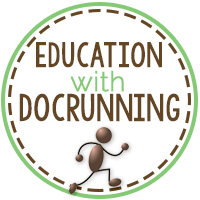Tips to ROCK the end of the year Blog Hop (Special Edition Social Sundays)

The end of the year is just around the corner, and I invited some friends to share their ideas on ways to ROCK the end of the school year. Grab your favorites
For me the end of the school year is an opportunity to learn and reflect and have a little fun, too. Here's five of my favorite ways to end the year in a way that students won't soon forget:
Student reflection: In my first year teaching, I was a little overwhelmed by the disruption of end of year activities. I had no real understanding of how many "slices" my class time would be divided into and how difficult it would be to do any "real" teaching. In desperation I asked my 8th graders to write a letter to themselves about their year, their hopes and fears for the future year, dreams, etc. I didn't have many too parameters and I promised not to read them. I gave them envelops and the next year sent the letters to the students about 1/2 way into the first semester. The kids (who were truly skeptical when I assigned the activity) loved it. I've formalized and customized the activity for students, but it is still one of my students' favorites.
Student prep for next year: Another fun activity for students is the "need to know" list. After a reflection survey that I distribute, students create need to know lists for future teachers. It contains everything from "I am a visual learner" to "I don't like to raise my hand in class because I don't want to sound dumb" to "I LOVE soccer." I encourage students to be honest with themselves about who they are and what would be helpful if their teacher(s) understood. I copy all the lists for students so they have enough to give out to their teacher(s). As we moved to more digital classrooms, I have students email themselves a copy. Students can then email the lists to their new teachers. Lots of teachers in my program do this now and we are all thankful for a little insight for our new students at the beginning of each year.
Reflection on my class: Like the "need to know" list students make for their future teachers, I ask students to work in groups to create a "need to know" list for future students in my classroom. These lists contain all kinds of information such as "ask questions, it helps" to "Dr. D. tells bad jokes." When we have more time, students create the "survivor's guide." The survivor's guide is a collaborative activity in which students create a short guide to surviving my class. Students include ideas about favorite activities or units, strategies when you get behind, and ways to warm my heart (Dark chocolate is always appreciated.) My new students use a scavenger hunt to explore these guides. The guides are a big hit with the students who create them and the students who receive them. I love bot the lists and guides not only for the beginning of the next year but also because they share insight into what my students thought of and learned from my class. I learn about their favorite (and least favorite) activities, ideas on how I communicate with them, and more. In short I improve my teaching because of their ideas.
Why did I learn this: Even I often ask why students need to learn something. The end of the year is an opportunity for students to reflect on the value of the subject (hopefully beyond, so I can get into college or because it was required.) In this activity students create persuasive posters showing why history is important in their lives. Students have to reflect not only on their learning but the relevance to their lives. It's fascinating to see the posters. Ideas about why history is important have included everything from to learn about and understand other cultures to creating cool settings for movies. This activity is popular at the beginning and the end of the year. I love to see how the ideas about the value of history change from September to May.
Prepping for next year: My final tip to the end of the year is really for my own sanity. Before I close my classroom, I plan (as much as possible) the first two weeks of the next year. Even when I don't know what I am teaching the next year, as is too often the case, I at least plan my beginning of the year activities such as why study history, guess who, and student inventories. I assemble all the handouts and links I will need and place them in my planner. When I return in August, I am somewhat ready to go for the year and have more time to focus on getting to know my new students.
Need more ideas? Check out the tips from my friends in the links below.

is a bi-weekly post sharing tips, ideas, resources, and products for teaching social studies. If you have questions or think there is something I should share, you can leave me a message in the comments below
or at
